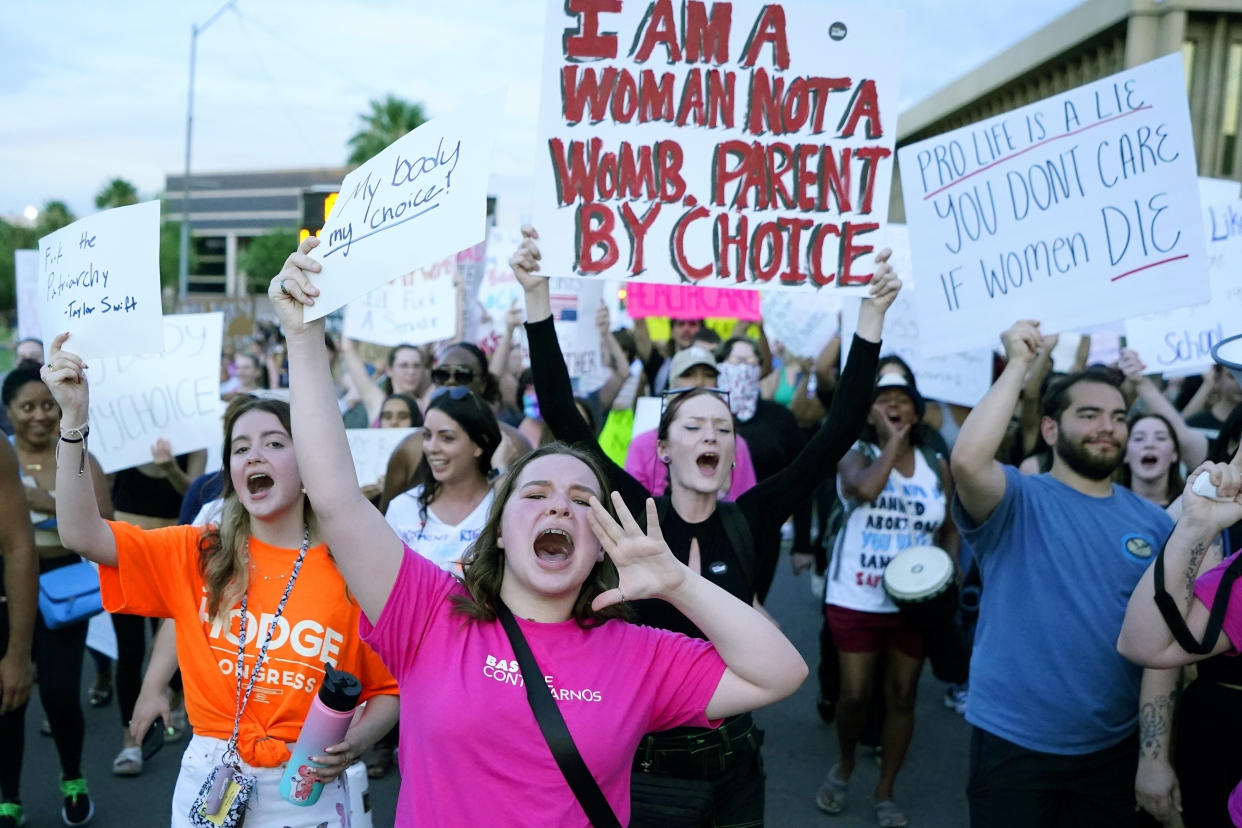What are the laws around abortion in the US?

Abortion was once again a defining moment in a US presidential election debate, as Donald Trump and Kamala Harris met across the podiums for the first time. The former president and the sitting vice president, respectively, traded barbs for 90 minutes at a fiery event in Philadelphia.
Trump once again repeated bizarre claims about "ninth month" pregnancy terminations and "execution after birth" being permitted in some states. The latter was swiftly shut down by host broadcaster ABC's moderator Linsey Davis, who at one point intervened to tell the Republican candidate: "There is no state in this country where it is legal to kill a baby after it's born."
Responding, Harris promised, if elected, to restore the "protections of Roe v Wade", the now overturned US Supreme Court ruling, which had previously confirmed a woman's right to terminate a pregnancy was protected by the US constitution.
Both sides have set out contrasting approaches to the issue, but why has it become such a dividing line in US politics and what are the candidates proposing to do about it?
What is Roe v Wade?
Roe v Wade refers to the legal challenge brought by Texan woman Norma McCorvey against the state's criminalisation of abortion except in cases where the mother's life was at risk.
The case, which started in 1969, was launched by McCorvey under the pseudonym Jane Roe and was defended by Henry Wade, the then district attorney for Dallas County – hence the name.
By 1973, the case had made it all the way to the US Supreme Court, where the justices ruled a woman's right to terminate a pregnancy was protected by the US constitution.

What happened to Roe v Wade?
The 2022 Dobbs v Jackson Women's Health Organization case, which challenged the state of Mississippi's ban on abortion after 15 weeks, marked the end of a constitutionally-guaranteed right to abortion after the Supreme Court's ruling – overturning Roe v Wade.
The ruling put decisions on abortion in the hands of individual states.
At the time, 13 states had already passed 'trigger laws' that would impose abortion restrictions automatically in the event of such a ruling from the Supreme Court.
What is Donald Trump's policy on abortion?
Trump is considered the main architect of Roe V Wade's overturning after his picks for the Supreme Court facilitated the 2022 ruling.
Speaking at Tuesday's debate, the former president said he wanted the decision to be left in the hands of individual states and not "tied up in the federal government".
However, he also dodged questions on whether he would approve a federally backed national abortion ban, if one was passed by the US Congress, despite his vice presidential running mate JD Vance claiming he would use the presidential veto to prevent such a law being enacted.

What does Kamala Harris want to do about abortion rights?
The current vice president has committed herself to "reinstating the protections of Roe V Wade" if she is elected president in November.
This is likely to take the form of a congressional bill, which she told the debate she would "proudly sign into law".
Trump, however, predicted the political make-up of the House of Representatives and US Senate would make it "impossible for her to get the vote" for such a law passed.
Instead, Harris's opponent compared it to stalled efforts to cancel swathes of student debt.
What do the states say?
Until Roe V Wade was overturned, the US constitution had guaranteed abortion rights throughout the first trimester of a pregnancy, with increasing restrictions throughout the second and third.
This remains the case, with some variations on restrictions for the second and third trimesters, in half of the 50 US states, mostly in the north east and on west coast.
This is also the case in Washington, DC, Puerto Rico and the US Virgin Islands, which are part of the US but do not have full state status.
A further 22 states have enacted bans, more than half of which apply from the moment of conception, with only a few making exceptions for pregnancies which are the result of rape or incest.
A handful of the 22 continue to allow terminations, but only within the first trimester.
States that ban abortion from the point of conception:
Alabama, Arkansas, Kentucky, Louisiana, Mississippi, Missouri, Oklahoma, South Dakota, Tennessee, Texas, Idaho (exceptions made for rape and incest), Indiana (exceptions made for rape and incest), North Dakota (exceptions made for rape and incest in the first six weeks of pregnancy), West Virginia (exceptions made for rape and incest in the first eight weeks of pregnancy, extended to 14 weeks for minors)
States that allow abortion up to 6 weeks from conception:
Georgia (exceptions made for rape and incest) Iowa (exceptions made for rape and incest), South Carolina (exceptions made for rape and incest), Florida (there is a vote due on whether to extend this later in 2024)
States that allow abortion up to 12 weeks from conception:
North Carolina, Nebraska (exceptions made for rape and incest)
States that allow abortion after 12 weeks from conception:
Arizona (15 weeks), Utah (18 weeks), Wisconsin (21 weeks, although court battles mean the current legal status of this is disputed), Kansas (22 weeks).
The following states permit abortion until the point of foetal viability (around 24 weeks): California, Connecticut, Delaware, Hawaii, Illinois, Maine, Maryland, Michigan, New York, Ohio, Rhode Island, Washington, Montana, Wyoming.
The following states permit abortion until 24 weeks: Massachusetts, Nevada, New Hampshire, Pennsylvania
In Virginia abortion is permitted until the third trimester, while in the following states there is no limit set: Alaska, Colorado, Minnesota, New Jersey, New Mexico, Oregon, Vermont.
Key milestones:
First trimester - conception to 12 weeks
Second trimester - 13 - 27 weeks
Third trimester - 28 - 40 weeks
Foetal viability - generally considered to be about 24 weeks
Are there any states where 'abortion' is carried out after birth?
No. Despite comments made by Trump during the election debate that suggested babies were being killed after birth, there is no state in which this is legal.
What are the consequences of defying a state's abortion ban?
Just like the bans themselves, the punishments - for those who receive or carry out an abortion, or even facilitate them, such as by helping people travel to other states where terminations are still legal - vary from state to state.
This can range from fines to hard labour and prison sentences.
The prison sentences on offer can range from a year to life behind bars with some states, such as Louisiana, considering moves to define abortion as homicide, an offence that carries the possibility of the death penalty.


